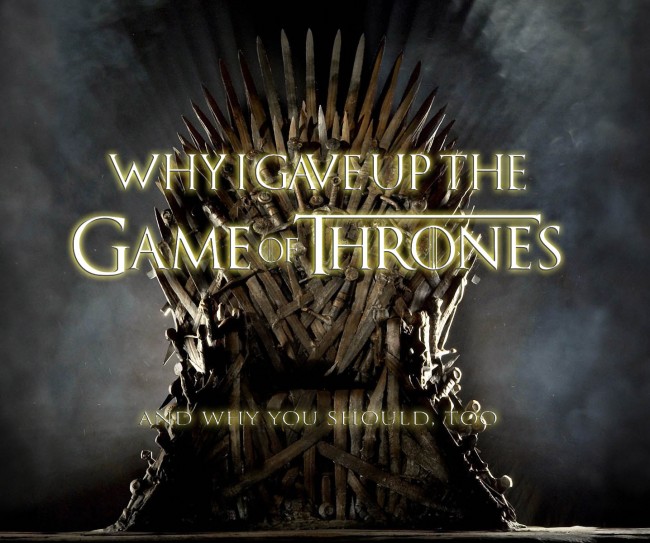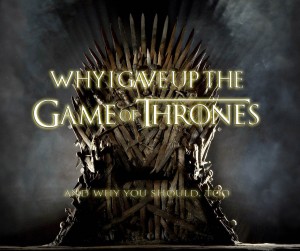
If you feel tricked and betrayed by HBO’s Game of Thrones, I am sympathetic. But I also want you to know that the series is worse than most critics are willing to admit.
Some critics (such as this http://prospect.org/article/game-thrones-and-problem-unhappy-endings) point out that there is unlikely to be any happy ending — but it should be clear by now that there will be no ending, happy or sad. Martin has created so many divergent plot-lines to the point of not being able to bring them together, ever. So what is the story about? There is no single story. Rob Stark’s brutal end showed that major plot-lines can be complete dead-ends. As such, it was a waste of time to follow it so closely. Rob Stark’s story will turn out to be, at best, a footnote to whatever the major plot is. So really, his story was a rouse, or a distraction. Is there a major plot? Possibly. The story starts with the Starks adopting baby wolves, so that tells us that this is a pivotal point in the history of Westeros. There is plenty of back-story, but the series and books begin there. Why? There can only be one reason, which is that one or more of the Stark children and their wolves are the main story. By the end of Book 3 (and Season 3), most of the Stark kids are gone or have lost their wolves. But Bran is still around, he has his wolf, and he has a strange power. So the books must be about Bran. Somehow, Bran Stark is the main character.
Unless these books are just full of random shit — which is looking more and more credible.
At this mid-way point, there are major figures that have very little to do with each other, except sharing spots on the “Who’s Hot in Westeros” list. They have a shared destiny, which is that the books will stop, but I strongly doubt that they will reach the end of their stories, or that their ends will justify the telling of their stories. Martin has tricked us about that before, and he seems unrepentant about it. He is completely willing to tell a “shaggy-dog” story that is interrupted by the dog’s head being lopped off.
I’m open to new forms. If there is no single story, that could work. If there is a different point the author is making with all of this, that could be worthwhile. If the books are an anti-epic, that could be cool. But I’d like to know what the point is, and why the author diverged from the usual epic-story conventions.
Sadly, I don’t think there is a point. Martin has created a world where random shit happens. Where good and bad people meet similar bloody ends, and life goes on without them. This is an “anti-epic” in that regard, but I seriously doubt that this series will maintain its anti-epic stance. We still have wolf-boy and dragon-girl who seem destined to make it to the end, and their journeys have all the trappings of “the chosen one”.
Martin has painted himself into a narrative corner. If he allows a noble-born righteous “chosen one” to triumph, he’s told an epic in the usual vein of a hero’s journey. At the same time, however, he’s telling us that he’s wasted our time with all the side-plots which lead nowhere and have no bearing on that journey. On the other hand, if he ends his seventh book without a final victory, we’ll all feel cheated, because the story starts and stops at meaningless points in time.
I argue that Martin is not so much telling a story as he is building a detailed world for us to experience. I applaud that endeavor, since I enjoy large-scoped fantasy universes such as Star Wars or Narnia. Unfortunately, Martin’s world is hell. Nobody can ever be happy, because even when the Seven Kingdoms are not killing each other, the White Walkers are killing everybody. And when the White Walkers aren’t around, the pending dark and cold winter will keep everyone miserable and/or dying. Old-timers wistfully tell of the halcyon past where different people were killing their ancestors, and other kinds of monsters threatened everybody. Everybody can and will be killed.
This is a terrible world, full of terrible people. Why does Martin make such a world? Or, to ask it a different way: Why do we spend time in his terrible world?
I don’t think we should. I think we’re better off ignoring his terrible world. I think we should be more discerning about the art and media we consume. I think we should call out people that have nothing positive to add to our world.
This is a fantasy. Fantasy can have many functions. It can teach, predict, and warn (Things to Come). It can pose allegory (Animal Farm) or satire (Gulliver’s Travels). Or, fantasy can just be a form of entertainment. And that’s where Martin’s books fit in — they are an amusement, written to tug on our emotions, and get us to imagine a different world.
Without having to rely on history, or to make a political point, Martin could have written anything. He was free to choose whatever setting, themes, and characters he wanted. Martin chose hell. This is a medieval-ish world, full of fantasy and magic — a sure-fire conceit to draw an audience! However: There is an amazing amount of violence. There is no respite. There is incurable sexism. There is tedious byzantine political intrigue. There is no justice. There is no progress. There is no moral, nothing to learn.
Martin chose these things as his ultimate dream world. He didn’t have to include any of these miserable desperate conditions, because this world does not parallel a time and place in human history. It wasn’t part of his childhood. It wasn’t “the way things used to be.” This is a fantasy — with dragons! It could have been anything.
What kind of person chooses to live in a nightmare? This is not a rhetorical question. This is a serious question about Martin’s character (or lack thereof). It’s a criticism of his art, and a call for each of us to question whether it’s the kind of art we want. Particularly in the realm of disconnected fantasy, we can have whatever we want. ANYTHING we want.
Game of Thrones is violence porn. It’s crafted to draw us into its prurient web without offering any lasting or redeeming effect. It pushes our buttons, so we find it hard not to look. But that’s all it does. Based on tried-and-true methods of popular entertainment, it takes the easy way into our minds and exploits our emotions. It distracts us from our lives for a little while with seductive negativity. Without giving anything back, it titillates us just long enough until the next thing comes along.
I’m looking for something better. Aren’t you?



Just read this post, even though its almost a year old. I have disliked GRRM and since Ice and Fire series since I was fourteen (a while ago) but I feel like no one is interested in hearing about it? This series is such a media darling but it is sooo creepy and prurient. Its basically the twilight of epic fantasy, but all the fangirls are twenty or thirty something men who can’t bear to be told that their favorite series is not only poorly written and kind of sad, but legitimately disgusting.
I agree. Very well said.
This is the single best analysis of GoT I have read on the net and it captures my exact same feeling on the phenomenon of GoT. The ending of this story cannot be a happy one because of the rules of the ‘game’. By creating a world of unrelenting despair and violence, a traditional happy ending grates against the narratives very nature. The only satisfying conclusion, in my humble opinion, would be a complete victory for the White Walkers. In my mind this ending would be consistent with the tone of the story, that all characters can die, that none of them are sympathetic and that power, absolute power (either through magic or sheer weight of numbers) will prevail over bravery, sacrifice and good. Anything else will feel hackneyed and cheap. To think of a convenient (not to mention painfully predictable) ending where Dany and the Dragons, replete with the gang of heroes, defeat all-comers and sits on the throne herself would be an enormous anti-climax and render the glacial sub-plots moot. Maybe that’s the point, maybe the nihilism of the world GRRM has created is entirely self-prophesying and has no greater meaning than to explore the cyclical cruelty of men and corruption of power, but if so, then it really will have been a waste of everyone’s time and money.
Ha! That’s a good one! “A complete victory for the White Walkers”! That *is* the only just ending, since those magical beings undo the evils of humans and everyone is alive once more! Oh, blessed White Walkers, how we’ve misjudged you!
But this story won’t have an ending; it’ll just stop. GRRM keeps writing more books and adding more subplots. The form is that of a soap opera: an endless parade of drama.